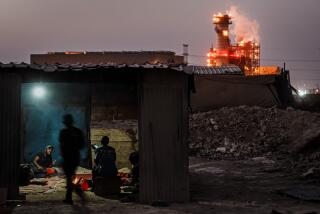Local Kurds Fear for Friends and Families Who Were Left in Iraq : War’s aftermath: While news reports spread dismay, some won’t call relatives because of possible reprisals.
- Share via
Hiwa Nezhadian of Agoura Hills feels guilty about his fellow Kurds.
Nezhadian is one of the 1,000 to 1,500 Kurds who have left the Middle East to establish new lives in Southern California. Far from their ancestral homes, they now watch in fear as friends and relatives try to survive the turmoil that followed the Persian Gulf War, which aggravated hostilities between Kurds and Saddam Hussein of Iraq, sending thousands of Iraqi Kurds fleeing to refugee camps and neighboring nations.
When Nezhadian called relatives several weeks ago, he discovered that 22 family members had fled their homes in Iraq to find safety with relatives in Iran.
Nezhadian 37, an American citizen who has lived in the U.S. for 15 years, said he is afraid that the U.S. will overlook the plight of the Kurds once the refugee camps disappear from newscasts.
“It’s a tragedy to be in a concentration camp in your own country,” he said. “They have to come up with a permanent solution.”
In Simi Valley, Marwan Mustafa says he feels a growing anger each time he sees television news showing fellow Kurds scrambling for food tossed on the ground.
“They used to live in villages and cities in Iraq, but Saddam Hussein destroyed them,” Mustafa said. “Now you see them on television fighting for food.”
When the exodus of Kurds to the mountain borders of Turkey and Iran began two months ago, Mustafa was horrified to think that distant relatives and friends may have been among the thousands who died making their way to the frontier.
“I’m worried about my family. I feel very bad,” said Mustafa, 34, who is studying laser optics at Moorpark College. “I feel like, why has it got to happen to them?”
Fouad Darweesh, an Anaheim-based spokesman for the Kurdish National Congress of North America, said he is grateful that the American military is building tent cities for Kurds in the mountainous northern regions of Iraq.
There are about 25 million Kurds scattered throughout “Kurdistan,” an area that encompasses parts of Turkey, Iran, Iraq, Syria and the Soviet Union. They are the fourth-largest ethnic group in the Middle East and the largest ethnic group in the world without a homeland.
Thousands of Kurds who have found safety in the United States fear for their loved ones, Darweesh said. Many have contacted his organization in search of friends and families trapped in refugee camps in northern Iraq.
“We have sent individuals to the area and met some of the people,” he said. “We don’t have much information, unfortunately.”
Some Kurds who have families in Syria and Turkey are reluctant to call relatives directly, Darweesh said.
“Those individuals who are active in any Kurdish movement, they will torture the rest of their families,” he said. “That’s why some people avoid getting in touch.”
In recent weeks, Mustafa has become involved with international relief organizations trying to send medicine to the Kurdish refugee camps.
He also has traveled hundreds of miles to join other Kurds who have staged political protests in Los Angeles and Orange counties. When President Bush paid a visit to Newport Beach in March, Mustafa and his wife, Bonnie, 42, journeyed there to join in the call to establish a Kurdish homeland.
Mustafa said he has already lost loved ones in past conflicts with Iraqi troops.
In 1975, when Mustafa was 18, two cousins were killed in an unsuccessful Kurdish rebellion in Iraq backed by the Shah of Iran.
Mustafa came to the United States six years ago for political reasons that he will not name, and he is reluctant to return to his native Syria where, he said, “just being Kurdish, you can get in trouble.”
“They don’t allow you to speak in your language, to read in your language,” he said.
Mustafa says he tries to maintain his ethnic heritage, speaking Kurdish, a language related to Farsi, with his American-born wife. He particularly is proud of the word kurd, which he said means “champion” or “hero.”
When friends ask him where he is from, he points to his jacket, where a map of the world shows his birthplace in Syria.
Bonnie Mustafa said she joins her husband to watch newscasts that show the Kurds scrambling for bread thrown from U.S. helicopters and off the backs of trucks.
“When we watch, if I look over at him, I can tell he is hurting inside,” said Bonnie Mustafa.
“Americans until recently didn’t know who the Kurds were,” she said. “They’re paying attention now, but once the Kurds are fed and the critical part is over, I don’t know.”
“The way I see it, they’re going to leave those people in the tents and Saddam will go kill them again,” Marwan Mustafa said.
More to Read
Sign up for Essential California
The most important California stories and recommendations in your inbox every morning.
You may occasionally receive promotional content from the Los Angeles Times.









